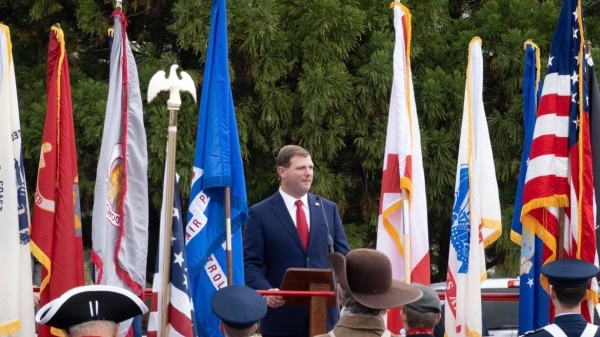By Brandon Moseley
Alabama Political Reporter
Wednesday, March 18 the Senate Constitution and Election Committee met to address how Alabama will deal with an Article V Constitutional Convention if 34 states actually approve a call for a new constitutional convention.
Under the terms of the U.S. Constitution there are only two ways to amend the document on which our government is based: Congress can pass an amendment or the states can pass a call for a new constitutional convention. In both cases, the amendment passed either by Congress or the convention must then be ratified by 3/4s of the states. Since that original convention all amendments have been introduced through the Congress. There are however several efforts under way to change that: there is a call for a convention solely to pass a balanced budget amendment (that Alabama passed); the Convention of States (COS) project to reign in the federal government with amendments to balance the budget, impose term limits, and reassert state sovereignty by limiting the scope of the federal government; and a call for a convention to pass amendments to impose stringent campaign finance reforms to limit the role of money in congressional campaigns. If any of these three efforts or another actually is ratified by 2/3s of the states, what is Alabama’s plan?
SB 112 Sponsored by Alabama State Senator Arthur Orr (R) addresses some of the mechanics of how Alabama would respond to a call for an Article V convention.
Senator Orr said, “This is a bill that passed through this committee last year. SB 112 sets parameters in case we have a Article V convention. If they ever get 34 states how is Alabama going to choose which delegates go? Will the Governor appoint Alabama’s delegation? The Chief Justice? The Attorney General?
Orr said that if there is to be an Article V convention the state legislature will appoint six delegates.
Sen. Cam Ward (R from Alabaster) said that he had grave concerns about a runaway convention. What if we appoint six delegates and Connecticut appoints 130? How do we know they wouldn’t just outvote the Alabama delegation? I have grave concerns about opening up the Constitution. This could be a free for all.
Sen. Orr said that one state one vote is sacrosanct. That is what was used in the 1787 convention. “In the event there is ever a convention what would Alabama do?” Orr said that the state legislature would select the delegation because we are representative of the people across the state.
The delegates would likely be members of the state legislature, but not necessarily so. Sen. Orr said, we could select the Chief Justice to be one of the delegates.
Orr said that SB 112 has a companion bill sponsored by Sen. Trip Pittman (R from Montrose) that would deal with rogue delegates and prevent a runaway convention.
Sen. Bill Hightower (R) asked, “Would we have a problem if his bill does not pass?”
Sen. Orr said that he did not know where Pittman’s bill was in the legislative process; but that we are doing this in two bills because that is what the people in Indiana did.
Sen. Ward said, “The original convention was to amend the Articles of Confederation.” “They threw the whole thing out.”
Sen. Orr replied that it was understood at the time that the delegates would propose a new convention. Orr warned that there are entrenched interests who benefit now who will fight to protect the status quo.
Sen. Bill Hightower said this is a public hearing. Why did no one sign up to speak on this?
A Mr. Bryan from Montgomery then did volunteer and he presented some concerns about the wording of one section.
One senator expressed concerns about the six member delegation and jokingly suggested we send 140 delegates (the combined houses of the Alabama legislature.)
The committee voted to give SB 112 a favorable report. The Senate Rules Committee can not introduce the measure for consideration by the full state Senate.
Terry Richmond is one of the legislative captains for the Convention Of States Project in Alabama. Mr. Richmond told the ‘Alabama Political Reporter,’ “I am gratified to see the Legislature is getting the rules in place to act quickly when the Convention of States is called. We have Applications working in 30 States this year.”
At a recent presentation, Richmond said that many conservatives believe that the federal government is too large, is out of control, and has exceeded the mandate that it received from the authors of the U.S. Constitution. Conservatives are however divided on exactly how to do that. The Convention of States Project looks to the U.S. Constitution and are proposing that states call an Article V convention to rein in the excesses of the federal government.
Richmond said that delegates to the convention would be tasked with limiting the power, jurisdiction, and scope of the federal government; consider term limits; and to impose fiscal accountability on the federal government.
The COS effort is supported by former Alaska Governor Sara Palin, conservative talk radio hosts Rush Limbaugh, Glen Beck and Mark Levin, as well as many other conservative leaders.
Critics believe that there is a danger of a runaway convention doing major damage to the Constitution.
COS proponents say the first level of protection is the commissions of the delegates. If they go outside their commissions the state legislatures could recall or replace their delegates. The second protection is the convention itself. While some delegates might propose a new constitution it would have to actually pass the convention. The states’ delegations would necessarily limit any radical departure from the commissions of the delegates. Finally whatever amendments are proposed at the convention would still have to be ratified by the states.
It takes 34 states to call a national conventions (2/3s); but it takes 38 to actually ratify any amendments (3/4s). All it takes to block ratification would be one house in 13 states. Each state can send as many delegates as they want; but each delegation gets just one vote at the convention.
Alaska, Georgia, and Florida have already passed COS resolutions and supporters have expressed confidence that they would be able to get 34 by the end of 2015.
Richmond said that Alabama almost became the first state to pass COS in the 2014 legislative session. It passed the Alabama House of Representatives and was on the calendar to come up in the Alabama Senate but timed out on the last day of the session.
Terry Richmond is working full time during the legislative session to lobby for COS in Alabama.



















































